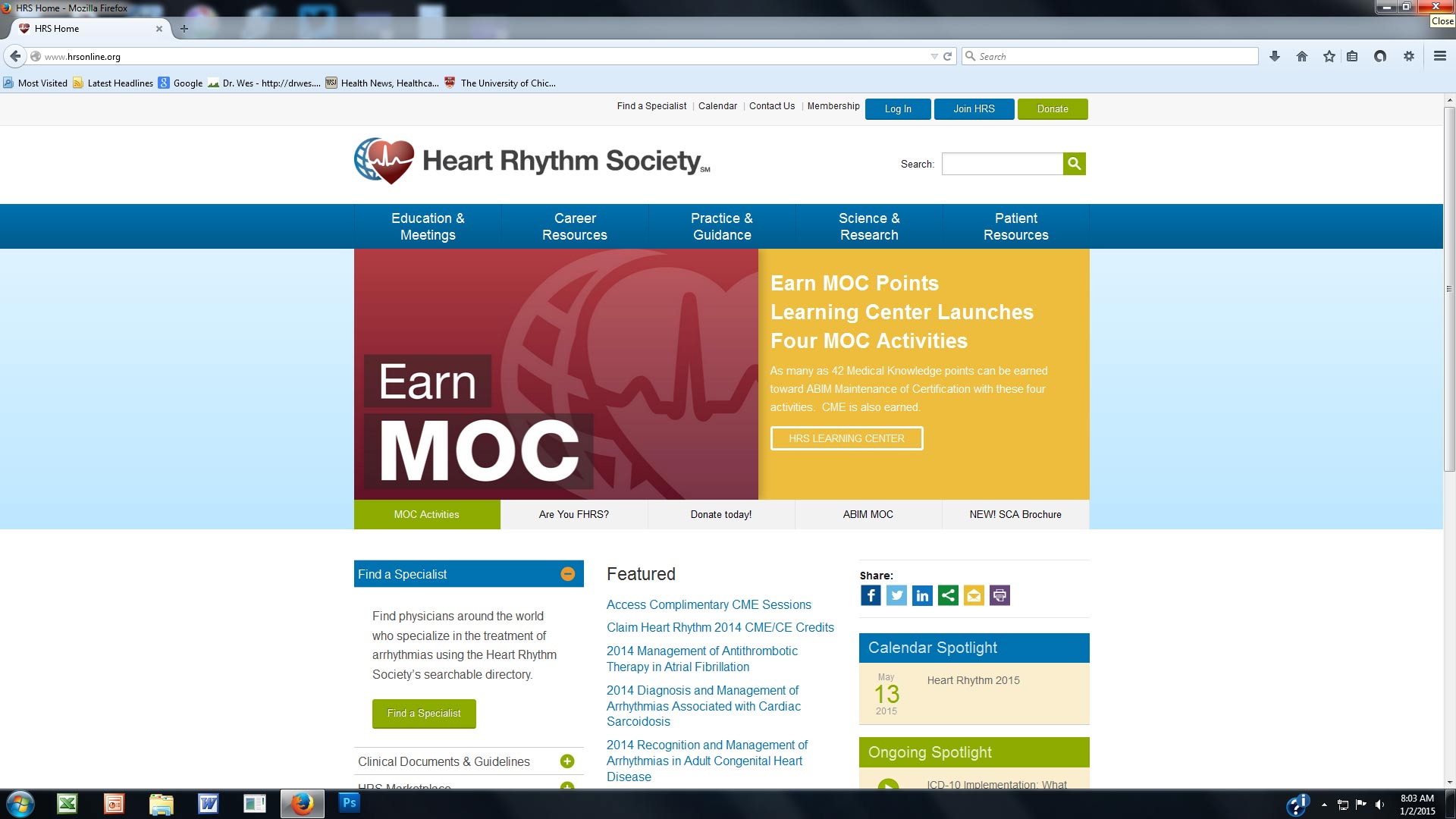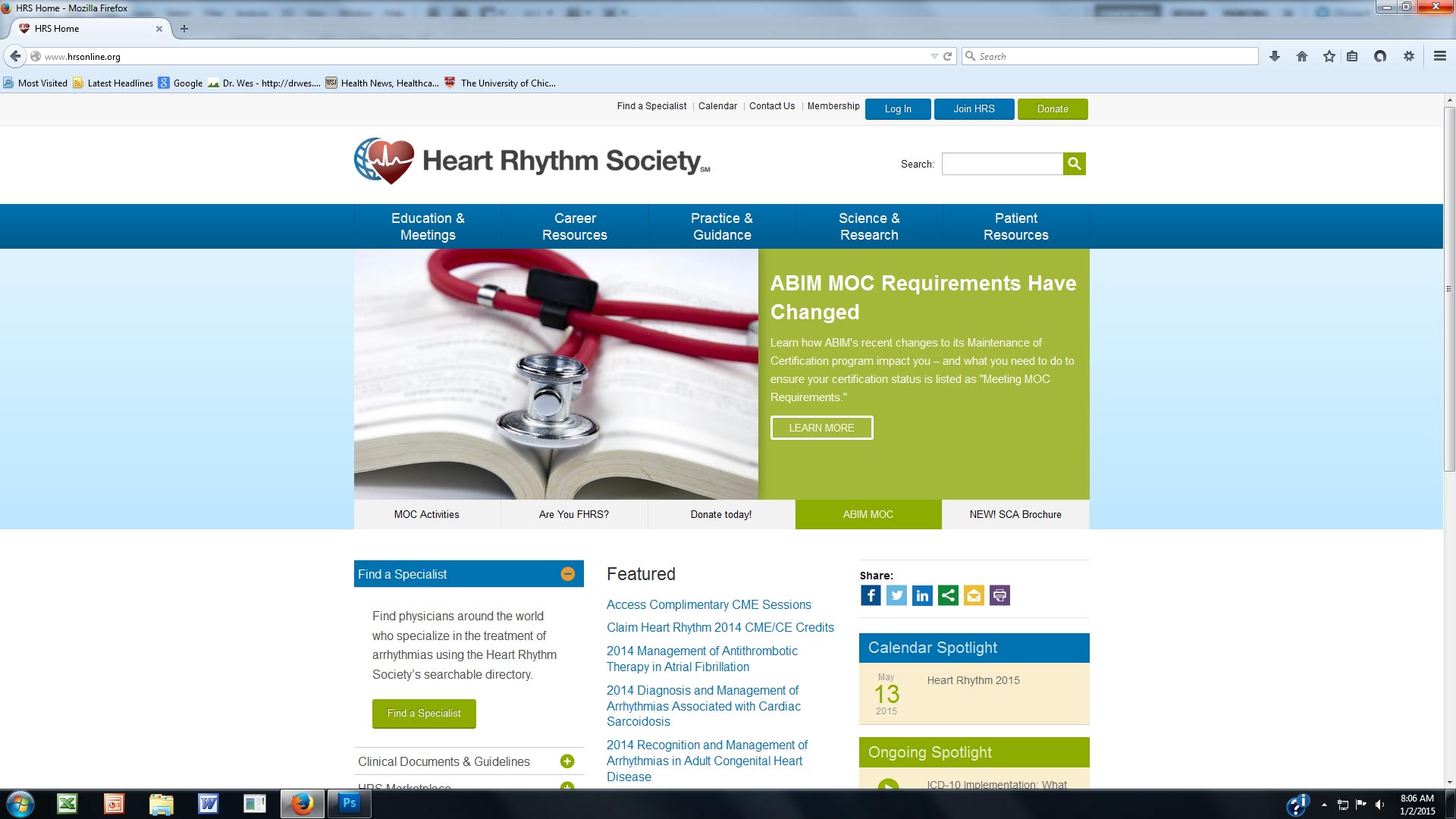Here's why.
The Affordable Care Act (ACA) modified Sections 1848(k) and 1848(m) of the Social Security Act which defines how CMS pays physicians for their services. Section (k) is the section that defines how a "Quality Reporting System" is to be set up (with subsection (4) requiring the "Use of Registry-based Reporting") and Section (m) defining physician incentive payments physicians might receive if quality reporting occurs properly. (Sadly, those CMS incentive payments do not cover the cost of participating in MOC for most of us.)*
Section (k) was modified by the ACA to include the ABMS MOC program as a "physician registry." The registry was "defined" as requiring all four parts of the MOC program created by the ABMS, including the much-maligned "practice improvement modules" that have been described by the physician community as overly time-consuming, irrelevant and may even violate federal research statutes regarding the study of physicians, their practices, and patients.
Unfortunately the new NBPAS does not address these requirements of the our new health care law, leaving the creation of the NBPAS to look like a Rand Paul moment all over again with physicians signing up for something that, legislatively, means nothing.
Welcome to the concept of "regulatory capture."
 |
| Screenshot of Heart Rhythm Society webpage |
But what's more important to our patients in the long run? Time for their needs or time for test-taking and survey collection? Is it more important to satisfy government requirements or address the real needs of our patients? Certainly continuing education of physicians is needed, but irrelevant work for an unaccountable third-party organization so they can measure us rather than help us is not.
 |
| A second Heart Rhythm Society webpage devoted to MOC |
I remain pessimistic that creating another "board" will fix the current deep-seated problems with the ABMS MOC construct with ABMS as the mothership directing a flotilla of 24 member boards. In my view the only way to truly "change" MOC is to have a coordinated effort from all specialty societies to insist our legislators remove the portion of our new health care law that requires we participate in a "physician registry" that robs not only practicing physicians, but patient care itself.
HRS and ACC, are you on board?
-Wes
*Addendum 2/12/2015:
It should be noted that the payment incentives offered 2012-2104 from CMS for participation in MOC ended January 1, 2015, but that MOC participation will still be used as a physician quality reporting metric.
9 comments:
However, one can usually complete other components of the ACA requirements under PQRS to meet ALL needs without resulting to the MOC component!
As such, I do not NEED to comply with the MOC PQRS and still get compliance. On the other hand, there will be increasingly physicains who simply see this as incentive to drop CMS patients because of the ever increasing nonsense of this and other federal mandates, which make Third party free "cash" practice every more desire able! That is the way it was before medicare!
The past president of the ACC, John Harold, was part of ABIM. These two entities are closely aligned. The ACC will never come out against MOC.
I stopped accepting third party payment almost 2 years ago, and I no longer admit to the hospital, ergo I cannot be coerced into MOC by an insurer or hospital.
As long as we fend off efforts to require MOC for state licensure (MOL), there is no reason to give in to this lunacy. My cert. will expire (permanently) at the end of this year.
I know that third party free practices are not feasible for many, but the more of them there are, the better.
I was at the last Leadership Luncheon at HRS in the San Fran Meeting. Someone asked specifically why HRS had not come with a specific statement acknowledging MOC and this lunacy. After a few uncomfortable seconds the answer was something like: "well because we were not asked to by ABIM and also because we are a Scientific Society not a regulatory one". I think it was Hugh Calkins who answered.
Here you could see how uncomfortable a few past presidents and Board Members of HRS were.
I wonder if there is anything wrong with HRS coming up with a statement saying something like "There is no firm scientific evidence that MOC is associated with improved care and/or outcomes". At the end of the day "we are just a Scientific Society".
I believe a science based statement from HRS would carry a lot of weight because it would not oppose directly MOC but it would clearly state were most of us stand on.
I love it !!!
Its time to put the ABIM/ABMS IN ITS PLACE.
$169 /2y x 10 years= $ 845
1) The ACA requirement can be easily and clearly completed without any burdensome requirements set forth in the MOC program. Any physician who completes an "appropriate" amount of CME can, and should, be considered as have completed that requirement-and let it go through a national registry if needed.
2)Doctors have forgotten that CMS is simply an insurance program (and really losing power as more and more patients now do not have medicare, but are in advantage plans-in which the insurance companies run the rules). We cannot just listen to an insurance company and change our practice based on what it says (even if it is run by the government). It was the duty of the ABIM to organize and speak against these requirements or modify them in ways that would help physicians-that is the ROLE of ABIM!!! (not just collect fees and make tests).
3) I really hope the new body succeeds, as I, and thousands of other physicians, believe that ABIM has failed.
At least ABIM will not be monopoly and might open to change if there is an alternative. We should support the new board.
I agree that we should support the new Board. It can add legitimacy with numbers and bring another voice to the table. At this point, many physicians are afraid to lose their jobs or be prevented from working in a variety of health systems due to trade restricting by-laws which require 'recertification' and MOC.
I agree with many of the comments above. Dr. Wes' points are well taken and understood, but they are only relevant if we are participating with third-party insurance. If enough of us will open Direct-Pay practices, it will greatly reduce the power of the ACA and ABMS (MOC). I did this myself two years ago and no longer have to worry about the bureaucratic busy work of MOC, ABMS, ICD-10, Medicare Audits, etc. or the expense associated with these things. My board certification will expire at the end of this year; and it does not matter. In fact, it simplifies my life and saves me time, headaches and otherwise wasted money. I read constantly and look up info in real time on my mobile phone. Guidelines and standard of care medicine are literally at your fingertips 24/7. This ability that current technology provides makes MOC obsolete. Board exams have already become obsolete as they focus too much on irrelevant, esoteric minutia.
As physicians, we are professional, adult learners who know best what works for us individually to keep our knowledge and skills up. We are a conscientious, motivated group and do not need bureaucracies and government forcing us to keep current. We should fight back and make sure whatever system is in place works for us. That is the best way to serve our patients. I applaud the ANBPS's independent spirit and hope it never gives us fighting the fight that needs to be fought. It had to start somewhere if we are ever to be successful. "If not us, who? If not now, when?"
Post a Comment